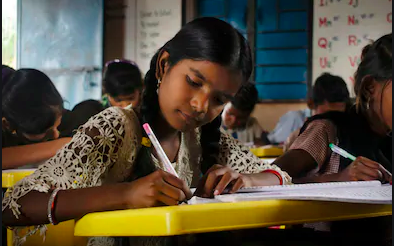In a country like India, education is very important. However, a certain way of thinking is set in stone. This prevailing thought process paired with a considerable generation gap leads to a constant struggle between the parents/ teachers and their students/children. Nevertheless, due to the constant evolution and the availability of information, this generation gap is reducing. But as well-wishers, here might be some concerns that the parents or teachers may have with regards to letting their children take ownership of their learning

1.Fear of uncertainty and the need to survive
It is safe to assume that most of the working population in India place the highest regard for education. A considerable number of parents work their jobs just so they can afford the best kind of education for their children. Some of the upcoming trends are recognized by the parents as a passing trend and are worried that their children will suffer in the long run, therefore, tried and tested ways of education are always safer. If a child is interested in exploring certain untouched areas of a particular subject, he might be discouraged from the beginning because it is a road less travelled. A statistic reported by Forbes Magazine shows that one of the main reasons for the failure of a child’s dream might be because of the parents’ fear of technology. In one of the surveys, almost as much as 49% of the students show signs of wanting to embrace a career in technology, which includes being an animator, vlogger, software developer, etc. But parents are on the fence about it for safety reasons or lack thereof. In the current economic situation and with the increasing saturation levels in almost every field, stability is naturally given more priority.
- “What will society say?!”
The fear of receiving criticism from society often hinders many from taking life-altering and unconventional decisions. Doing anything slightly different is initially received with a fair amount of reservations and resistance. Generations that came in just after Indian independence laid emphasis on education as a means to get a job. on the contrary, with the increase in the standard of living, the younger generations are looking into making a livelihood out of their passions, be it in science or fashion. Parents and teachers are aware of the harsh world where more often than not passions give way and the aftermath is not a pretty sight.
- The stress of “not doing enough” or “not being good enough”
The concept of freedom might be uncommon when it comes to education because there might be a blanket assumption that the necessary amount of knowledge acquired is not sufficient to “survive” in the real world. This particularly might be so because children lack experience, hence the required maturity. But with change also comes exposure which the younger generations have more access to and an increase in the willingness to experiment and help build competency on the go can be taken into consideration.
- The wish to live vicariously through their children
The wish of a parent to see their child live the life of their dreams is not unheard of. This probably is common throughout all economic structures. In a family, where the parents are clerks(say), they probably had the dream of becoming doctors but couldn’t make it due to various circumstances. So, they suggest their child/ children to pursue medicine, without paying much heed to what interests the child. This act of unloading the burdens of their(parents’) unfulfilled dreams onto the child/children’s shoulder, without paying attention to their aspirations is indeed unfair to the child’s capability and self- worth
There is no denying that teachers and parents are two of the most important driving forces in the life of a child. With this comes enormous responsibility which can make or break someone. Teachers may generally not want anything to go wrong not only because of the consequences they have to deal with but also because they are accountable to higher authorities. But one must also keep in mind that society plays an important role in bringing about a change.
When ownership of the education is parted with the child, the possibility of growth is tremendous. Not only does it instill a sense of confidence and trust, but it also builds a responsible human being. In conclusion, in the word of Marva Collins; “When someone is taught the joy of learning, it becomes a life-long process that never stops, a process that creates a logical individual. That is the challenge and joy of teaching.”
-This blog was written by Anagha Shastry. One of the few amazing bloggers we have in our team.

Well written blog. Unfortunately education is basis for jobs. People get education to get employed and not for gaining knowledge. Most parents think getting a secured job is most important thing. In fast changing world there is nothing like permanent job. Continuous learning, upgrading skills and passion is the only thing which will guarantee employability.
LikeLike
Very true Vijay sir. Today and even in the coming future the only thing which will make a difference will be “Continuous learning, upgrading skills and passion is the only thing which will guarantee employability.” like you said.
LikeLike